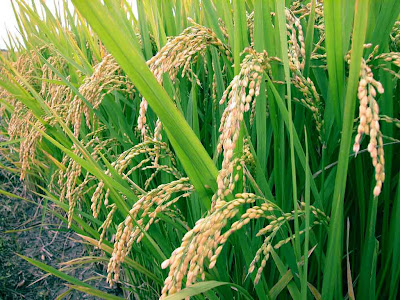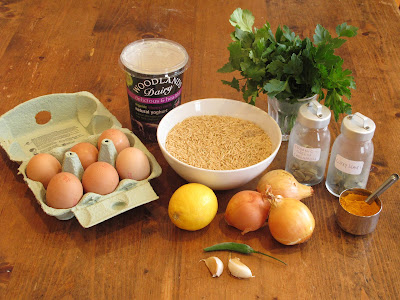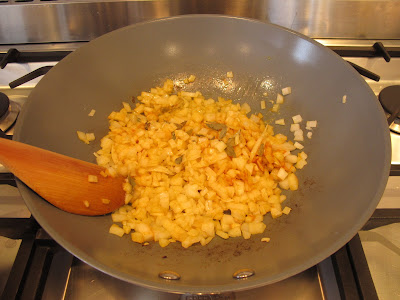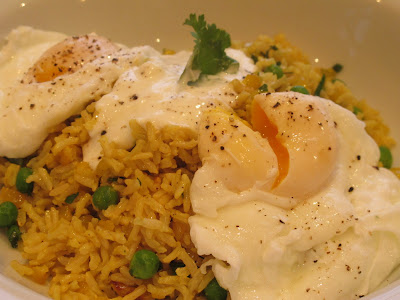 |
| Basmati rice plantation in Pakistan phto: pakagri blogspot |
For me there is nothing like having a pack of rice in the pantry. It helps me throw together a last minute meal. The other night, my friend Mark, who is vegetarian, came to visit us and I didn’t have anything prepared for dinner. Then, I thought: rice, eggs, spices, yoghurt, herbs... It quickly took me back in time.
When I was growing up, we used to love the combination of rice with natural yoghurt. It came from the Lebanese side of my family. I once read a recipe by Ottolenghi which combines most of those ingredients I mentioned above - it must be a Middle-Eastern thing. He cooks this dish for brunch. It makes for a great breakfast but I can eat this at any meal! And I recommend it.
 |
| The ingredients |
 |
| Sautee the onions with the spices |
 |
| Prepare the rice while the onion mixture caramelizes |
 |
| When the onion and spices are done... |
 |
| ...add the peas, mix and put aside. |
 |
| poaching the egg |
 |
| When rice is done add it into the wok and mix all together |
 |
| My Basmati rice with spices and poached eggs! |
Brown basmati rice with spices and poached eggs
Serves 4
This dish has a great combination of spices and is packed with nutrients. It has a perfect balance of protein, complex carbohydrates and fibre. For a non-vegetarian option have it with a piece of grilled or barbecued salmon instead.
INGREDIENTS
400g brown basmati rice
4 tbsp ghee or organic coconut oil
3 small onions or 1 large onion, finely chopped
2 garlic cloves, finely chopped
a pinch of curry leaves (if you can’t find them, use 1 generous tsp of curry powder)
8 cardamom pods
2 tsp turmeric powder
1-2 fresh green chilli thinly sliced (depends on how much spicy you like)
2 garlic cloves, finely chopped
a pinch of curry leaves (if you can’t find them, use 1 generous tsp of curry powder)
8 cardamom pods
2 tsp turmeric powder
1-2 fresh green chilli thinly sliced (depends on how much spicy you like)
1 cup of frozen organic peas (optional)
1 tbsp white wine vinegar
8 eggs (2 per person)
1 tbsp white wine vinegar
8 eggs (2 per person)
a large handful of parsley leaves, chopped
a large handful of coriander leaves, chopped
a juice of 1 lemon
8 tbsp natural organic yoghurt
salt and black pepper
a large handful of coriander leaves, chopped
a juice of 1 lemon
8 tbsp natural organic yoghurt
salt and black pepper
METHOD
Cook the rice per packet instructions.
Cook the rice per packet instructions.
Heat the oil in a wok or in a large saucepan. Add the onions and garlic to the oil and cook over a low heat until the onions are transparent. Add the cardamom, curry leaves, turmeric, chilli, and season with sea salt. Continue to cook, stirring, for about 4 minutes. Turn the heat off and reserve.
Boil the peas for about 3 min, remove from the heat and drain.
Poach the eggs. While the final egg is cooking, add the rice and stir well with the spiced mixture. Stir the peas, coriander, parsley and lemon juice into the rice and fluff with a fork. Taste and adjust the seasoning, adding more lemon juice if you like.
Serve the rice in bowls, spoon in some yoghurt and place the eggs on the top. Sprinkle with some salt and black pepper.
Some of the ingredients and their functional properties
Basmati rice: wholegrain basmati is an excellent complex-carbohydrate food. It is gluten free and low in fat and sodium. In India, rice symbolizes fertility, wealth and good health (that is why rice is still today thrown at newlyweds to bless them with healthy children and prosperity). Basmati rice is easy on the digestive system. According to Ayuverda Medicine (http://nccam.nih.gov/health/ayurveda/introduction.htm), rice balances Vata and Pitta doshas. Kapha types, however, should avoid eating rice too often. Basmati rice is a good source of the B vitamins, selenium and iron. White basmati rice contains the lowest glycemic index comparing with any other white rice types, but brown basmati has an even lower glycemic index.
Cardamon (Elettaria cardamomum): According to Ayurvedic medicine, cardamom is very beneficial for those suffering with gastrointestinal problems. It is very good to combat flatulence and gas and improve digestion. It has detoxifying properties and acts as a good cleanser. Cardamon contains a compound (cineole) that helps prevent and treat sore throat and laryngitis.
Egg: is a fantastic and inexpensive source of protein. It contains lecithin, which helps the body to break down fat and cholesterol. Lecithin is also a source of the B vitamin-like choline, which is necessary for the brain development at pregnancy. Choline is an important nutrient for the prevention of fatty liver and is a neurotransmitter involved in many functions, including memory and muscle control. Egg also contains biotin, another B vitamin-like compound, which is very important for the digestion of fat and protein, and essential for the health of hair, skin and nails. Egg contains an antioxidant called glutathione, that prevents the formation of free radicals. It is very rich in Omega-3 fats, which prevent diabetes, obesity and depression. Contains vitamin A and E, folic acid and lutein (an antioxidant in the carotenoid family that helps to keep the eyes healthy and safe from oxidative stress).
Peas (Pisum sativum): they’re a source of protein, carbohydrate and fat. They’re a mild laxative; strengthen the spleen, pancreas and stomach; and harmonize digestion. Peas contain B vitamins, vitamin C, magnesium, vitamin K, potassium, iron and carotenes.
Turmeric (Curcuma longa): it has anti-inflammatory properties, protects the liver from toxins, has high levels of antioxidant, lowers cholesterol and has been shown to inhibit the replication of HIV-1. Some research has shown that a supplement of turmeric has improved flexibility and reduced joint swelling in people who suffer from rheumatoid arthritis. It improves protein digestion, reduces uterine tumours, dissolves gallstone and reduces period pain. According to Paul Pitchford (Healing with Wholefoods), a good dosage of turmeric, ¼ -1/2 teaspoon daily, can be used as spice or taken in capsules.
Till next week!

No comments
Post a Comment